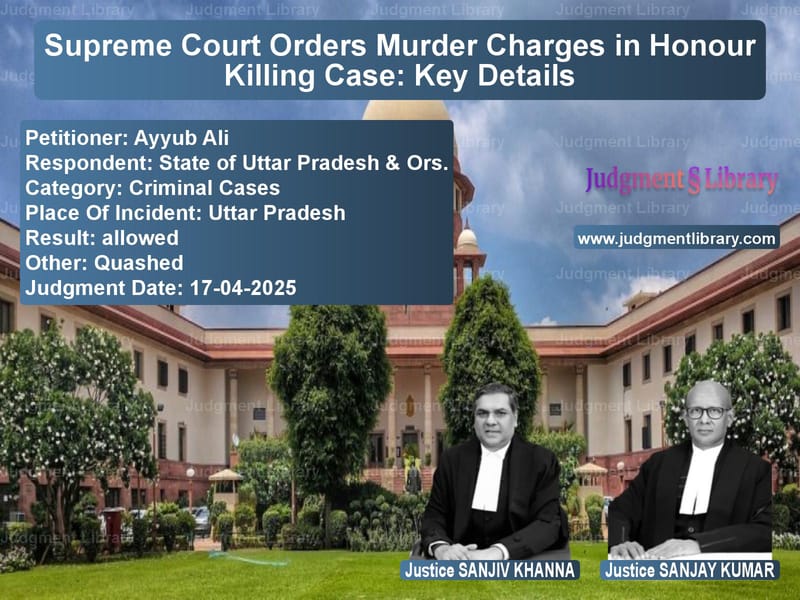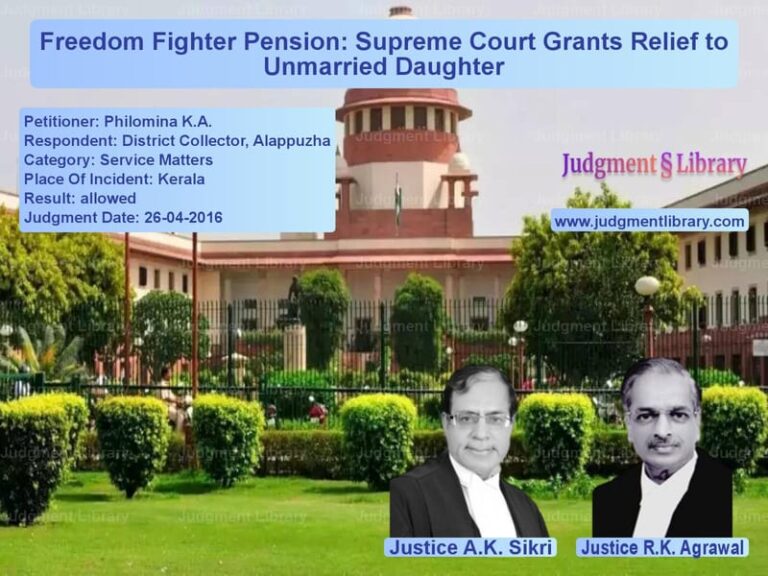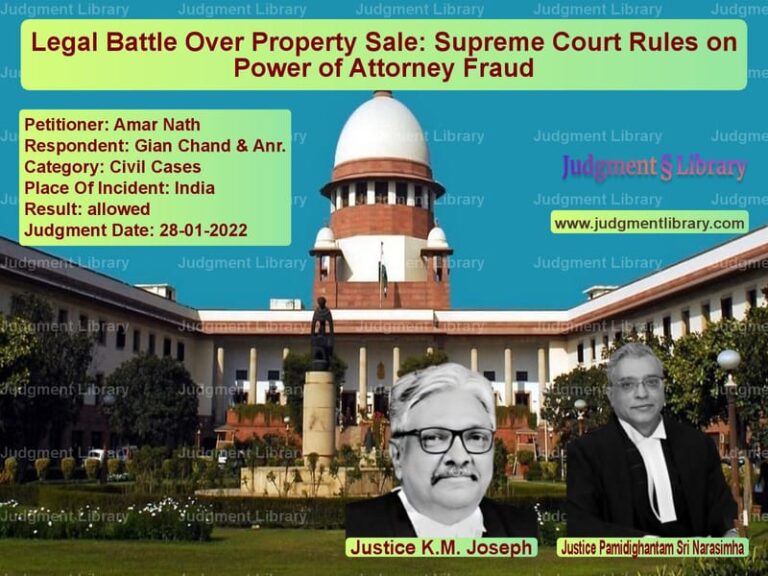Supreme Court Orders Murder Charges in Honour Killing Case: Key Details
The Supreme Court of India recently delivered a significant judgment in the case of Ayyub Ali vs State of Uttar Pradesh & Ors., directing that charges be framed under Section 302 (murder) of the Indian Penal Code (IPC) in a suspected honour killing case. The judgment, delivered by Chief Justice Sanjiv Khanna and Justice Sanjay Kumar, overturned the decisions of the trial court and High Court which had earlier framed charges under Section 304 (culpable homicide not amounting to murder) of the IPC.
The case involves the brutal killing of 26-year-old Ziyahur Rahman (also referred to as Ziyahul/Ziaul Rahman in court documents), who was allegedly beaten to death with sticks and rods. The victim’s father, Ayyub Ali, approached the Supreme Court challenging the framing of charges under Section 304 instead of Section 302 IPC. He argued that the nature and number of injuries clearly indicated an intention to kill, making it a clear case of murder.
The postmortem report revealed shocking details – the victim had suffered 14 antemortem injuries, including severe dural hematoma under the left parietal and frontal bone. The cause of death was recorded as shock and haemorrhage. Despite these findings, the investigating officer had filed charges only under Section 304 IPC, and the trial court accepted this position, observing that since the injuries were inflicted by sticks rather than sharp weapons, it didn’t warrant a murder charge.
The Supreme Court strongly disagreed with this reasoning. Quoting from its earlier judgment in Ghulam Hassan Beigh v. Mohd. Maqbool Magrey & Ors., the bench observed: “Whether the case falls under Section 302 or 304 Part II, IPC could have been decided by the trial court only after the evaluation of the entire oral evidence that may be led by the prosecution as well as by the defence, if any, comes on record. Ultimately, upon appreciation of the entire evidence on record at the end of the trial, the trial court may take one view or the other i.e. whether it is a case of murder or case of culpable homicide. But at the stage of framing of the charge, the trial court could not have reached to such a conclusion merely relying upon the post-mortem report on record.”
The Court noted that the trial court had made a fundamental error by prematurely concluding that the case didn’t merit a murder charge. The bench emphasized that at the charge-framing stage, the court’s role is limited to determining whether a prima facie case exists, not to evaluate the strength of evidence. Given the nature of injuries and the circumstances, the Supreme Court found that charges under Section 302 read with Section 34 (common intention) of IPC were clearly warranted.
In a significant direction, the Supreme Court ordered the Uttar Pradesh government to appoint a Special Prosecutor to conduct the trial, after consultation with the victim’s father. The bench gave the state six weeks to comply with this direction and file a compliance report. The Court also allowed the accused to apply for bail in view of the amended charges, directing that such applications be decided within three weeks of filing.
While allowing the appeal and setting aside the earlier orders, the Court clarified that its observations shouldn’t be construed as findings on the merits of the case. The trial court would have to decide the case based on the evidence presented during trial. This judgment serves as an important reminder about the proper approach to be taken while framing charges, particularly in serious offences like honour killings where the intention to commit murder is often evident from the brutality of the attack.
Petitioner Name: Ayyub Ali.Respondent Name: State of Uttar Pradesh & Ors..Judgment By: Justice SANJIV KHANNA, Justice SANJAY KUMAR.Place Of Incident: Uttar Pradesh.Judgment Date: 17-04-2025.Result: allowed.
Don’t miss out on the full details! Download the complete judgment in PDF format below and gain valuable insights instantly!
Download Judgment: ayyub-ali-vs-state-of-uttar-prade-supreme-court-of-india-judgment-dated-17-04-2025.pdf
Directly Download Judgment: Directly download this Judgment
See all petitions in Murder Cases
See all petitions in Bail and Anticipatory Bail
See all petitions in Judgment by Sanjiv Khanna
See all petitions in Judgment by Sanjay Kumar
See all petitions in allowed
See all petitions in Quashed
See all petitions in supreme court of India judgments April 2025
See all petitions in 2025 judgments
See all posts in Criminal Cases Category
See all allowed petitions in Criminal Cases Category
See all Dismissed petitions in Criminal Cases Category
See all partially allowed petitions in Criminal Cases Category







